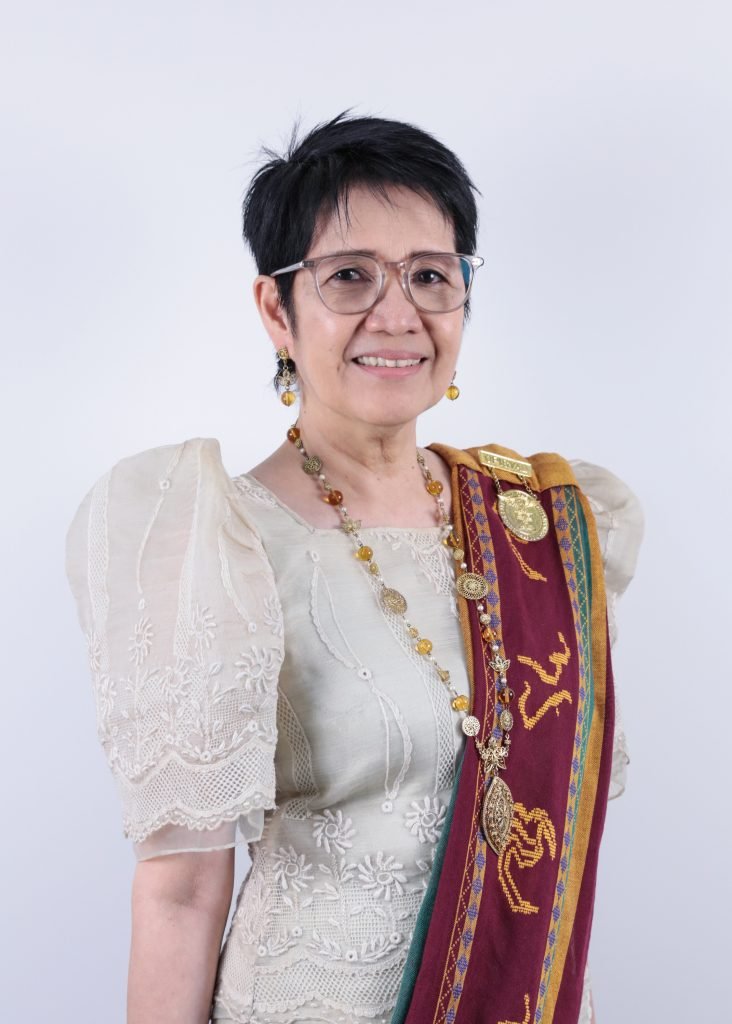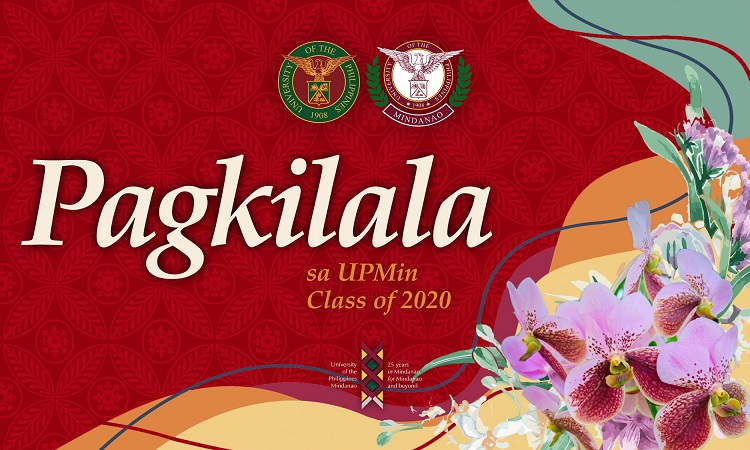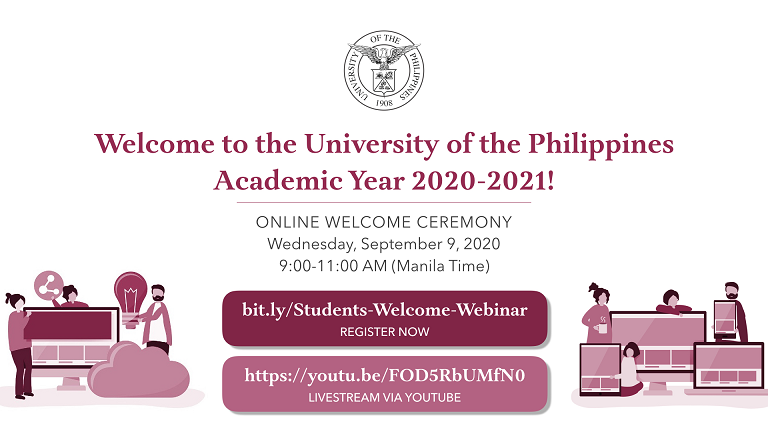Remote Learning for the First Semester of Academic Year 2020-2021

4 September 2020
Through the Chancellors
ATTN: Vice-Chancellors for Student Affairs; Directors, Offices of Student Affairs
Vice-President for Academic Affairs
The world continues to confront the challenges and uncertainties brought about by the SARS-CoV-2 virus. This situation compels the University to define a new normal in providing learning opportunities for you. As with other universities worldwide, U.P. is shifting to remote teaching and learning, and adopting alternative modes of assessment that are consistent with its mandate as The National University committed to quality education and at the same time concerned about the impact of the COVID-19 pandemic on you and our faculty.
In remote teaching and learning, teachers and learners do not meet in a physical classroom; instead, teaching and learning are enabled using information and communication technologies. Courses are delivered through alternative modes covering the entire spectrum of synchronous and asynchronous communication, from text-based (basic email, FB messenger, Viber group, etc.) to online meetings (via UVLe, Zoom, Google Hangouts, Google Meet, etc.).
Several factors made it imperative for UP to decide to deliver courses to you remotely. First, the trajectory of the COVID-19pandemicremains uncertain, and the number of cases in the Philippines continues to grow exponentially. While the UP COVID 19 Pandemic Response Team’s modeling suggests that the SARS-CoV-2 infection is reaching its peak in the country and may begin to decelerate, the outcome would depend on variables such as the level of testing and contact tracing, the availability of protective gear for frontline health workers, and the degree of people’s compliance with public health protocols, among many others.
Second, the outbreak of new COVID-19 cases in Asia-Pacific countries (e.g. China, Singapore, South Korea, Vietnam, and Australia) that had previously controlled the spread of the virus through massive testing and contact tracing underscores the uncertain trajectory of the pandemic.
Third, even assuming that a vaccine becomes available within the First Semester AY 2020-2021, the logistics of its mass production and procurement for eventual use will still result in a delay in mass immunization.
Fourth, conducting face-to-face classes in the midst of the pandemic and the high level of anxiety over contracting the disease among the public, may render the UP community vulnerable not only to SARS-CoV-2 infection but to mental health issues as well.
A major concern of both students and their parents is the quality of remote versus face-to-face learning. Remote learning is commonly perceived to be inferior to residential learning in terms of quality. This is understandable because Philippine education has traditionally been face-to-face and predominantly lecture-based. However, properly planned and implemented, guided independent study can be of the same quality as the usual teacher-dependent learning despite its remote delivery.
In light of the pandemic, specific competencies that some professional fields require may not be fully honed when students graduate. For this reason, the University is investing in subscriptions to platforms and simulation apps. It, for instance, subscribed to a leading provider of scientific videotapes and virtual experiments. The College of Medicine has also obtained virtual dissecting tables in lieu of cadavers for the students to use.
Cognizant of competencies that need to be honed even after students graduate, the University is developing bridging programs in Midyear 2021 for students who may wish to hone competencies from the actual application of skills learned in face-to-face contexts. In the spirit of lifelong learning, these programs will be open to alumni especially those whose skills courses were affected by the pandemic. For instance, students who will graduate this semester or next semester without sufficient skills in surgery because the Philippine General Hospital’s Department of Surgery was temporarily closed due to COVID-19 may avail of the bridge program the UP College of Medicine will develop.
STUDENT SUPPORT
To help you deal with the challenges of remote learning and build emotional resilience in the midst of adversity, the University, in consultation with the students, has revised the pre-COVID Student Affairs System (SAS). It has added four new programs—Learning Assistance Grants; Peer Learning Groups and Networks; Student Wellness System and Networks; and Student Helpdesk and Guidance—while currently enhancing existing programs and services (See Figure below).
The attached U.P. Roadmap for Student Affairs AY 2020-2021 presents the systems, policies, and programs that provide support and other services to enrolled undergraduate and graduate students.
In support of remote learning, the University is providing academic support to Filipino undergraduate students, including those enrolled in Law and Medicine, who will apply for learning assistance. As determined by the UP Student Affairs Units, students from low-income households shall receive Internet Connection worth P1500 a month through a TELCO of their choice this Academic Year. Based on their updated application information, applicants from the most vulnerable households shall be offered gadgets on top of the Internet connectivity subsidy granted to them.
To expand the support to financially challenged students in accessing remote learning tools, UP launched the Kaagapay sa Pag-aaral ng Iskolar ng Bayan Program. Kaagapay has mobilized the private sector to donate computing devices that will be made available to those who applied for learning assistance.
To expedite the processing of applications and distribution of academic support, the University developed the Student Learning Assistance System (SLAS). The SLAS is an expansion of the Student Financial Assistance Online (SFA Online). The expanded System will gather information on students' financial capacity, connectivity situation and connectivity options, and learning assistance requirements to help the University identify students in need of academic support and financial assistance.
COURSE PACKS
UP faculty members have prepared course packs for courses that will be offered in the First Semester AY 2020-2021 to enable students in areas with poor connectivity to use the USBs in their computers and download materials from learning platforms whenever they are able to connect. But if this is still not possible because students either have no gadgets or access to the internet, course packs will be printed and delivered to them (e.g. by courier if available, through arrangements with LGUs, delivery by UP personnel if feasible).
The provision of course packs is not unique to remote learning[1]. However, it is essential in remote learning as the primary means of delivering the course content and ensuring that none of you is left behind. Course packs are intended to support guided independent learning, which is one of two components of effective learning (the other component is interaction and dialogue). Because you will be studying on your own for the most part, the course pack for remote learning is more comprehensive than a course pack for use in face-to-face classes —i.e. the course pack for remote learning includes not only the course readings (e.g. journal articles, book chapters) and multimedia resources (e.g. video lectures, screencasts, simulations) but also study guides for each set of readings and activity and assignment guides.
Faculty members were asked to upload their course packs in the learning management systems (LMSs) of the Constituent Universities before the start of classes on 10 September 2020. However, faculty members who are preparing course packs for more than two classes, as well as those requiring more time to prepare their technology-dependent or enhanced learning resources, will be providing students the course packs at different intervals. However, they are enjoined to provide course guides and organize their students on the first day of class, communicating with them through the most appropriate means based on the student information obtained during pre-enlistment and enrollment.
Please note that copyrighted materials in your course pack that you access from your CU LMS or receive in a USB or printed form are intended only for your use in connection with the course that you are enrolled in. Distribution or sale of these materials constitutes a breach of the Intellectual Property Code and is punishable by law.
FIRST SEMESTER SCHEDULE
The First Semester AY 2020-2021 will be 14 weeks long, starting on 10 September 2020 and ending on 18 December 2020. Please take note of the following information related to this modified schedule of the First Semester:
1. Remote learning entails more time for independent study guided by the faculty handling the course.
2. The University Mobility in Asia and the Pacific (UMAP) Credit Transfer System, which was approved for adoption by the BOR at its 1351st meeting on 21 May 2020 provides the equivalent number of hours of student workload per credit unit of a course (1 credit unit = 38-48 hours student workload).
3. Student workload comprises the time needed to do independent study, attend synchronous class or consultation sessions, and learning assessments (activities, assignments, quizzes, examinations).
4. There will be no face-to-face classes on campus. Any exception is subject to the approval of the CU Chancellor and to compliance with IATF guidelines and processes.
SYNCHRONOUS ONLINE TEACHING AND LEARNING
1. Synchronous teaching and learning is where faculty and students interact in real-time. It includes webinars, live broadcasts, chats, and teleconferences (using applications such as Zoom, Skype, Google Hangouts, Facebook Messenger, among others). These allow for immediate feedback and facilitate the flow of information and collaboration.
2. Synchronous online meetings for the purpose of discussions and consultations will be held only during the class hours indicated in the Form 5 of students.
3. There will be no synchronous online meetings during holidays.
4. You are encouraged to use earphones or headsets with microphone during online meetings to minimize background noise especially if there are many distractions in your home.
5. You are not allowed to attend synchronous online meetings outside of your place of residence or work as long as your community is still under general community quarantine, unless excepted from such a quarantine with appropriate government rules and regulations.
6. Permission should be obtained prior to recording or taking of screenshots during online meetings.
ACADEMIC INTEGRITY
As a student of the University of the Philippines, you pledge to act ethically and uphold the values of honor and excellence[2]in all your undertakings including your activities in the Internet.
You understand that suspected misconduct on given assignments or examinations will be reported to the appropriate office and if established, will result in disciplinary action in accordance with University rules, policies, and procedures.
DATA PRIVACY
You are reminded of the UP Privacy Policy Notice for Students, which you can access at https://privacy.up.edu.ph/privacy-notices/ups-privacy-notice-for-students.html.
You understand and agree that in order to help UP uphold your right to privacy and to comply with laws, rules, regulations, UP policies, and issuances, you must take all reasonable steps to secure and keep confidential the credentials (passwords, passcodes, meeting IDs and passwords, etc.) provided to you in order to access UP’s data processing systems (eg UP mail, registration systems learning management systems), online classes held via Zoom, Google Meet, and such other video- or teleconferencing resources, electronic subscriptions and the like. You agree that you will not, through any act or omission, enable third parties to use such credentials when to do so would violate or would lead to the violation of existing laws such as the Data Privacy Act of 2012, Intellectual Property Code of the Philippines, Cybercrime Prevention Act of 2012 and other applicable laws, rules and regulations University policies such as the policies governing staff and student discipline, the Acceptable Use Policy (AUP) of the University, IT security issuances and measures and the like. You understand and agree that in the event you violate such undertaking UP may, pursuant to applicable laws, rules, regulations, and UP policies, including its AUP, suspend and/or cancel such access credentials without prejudice to and in addition to all other legal remedies and actions that UP and or affected third parties may take against you.
ACCEPTABLE USE POLICY
You are reminded of the Acceptable Use Policy of the University (AUP), which you can access at https://upd.edu.ph/aup/.
INTELLECTUAL PROPERTY RIGHTS POLICY
You are reminded of the UP Intellectual Property Rights Policy, which you can access at https://ovpaa.up.edu.ph/wp-content/uploads/2015/11/UP-IPR-Policy.pdf.
COPYRIGHT GUIDELINES
Course materials that have been reproduced and communicated to you by or on behalf of the University of the Philippines are pursuant to PART IV: The Law on Copyright of Republic Act (RA) 8293 or the “Intellectual Property Code of the Philippines”.
The University does not authorize you to reproduce or communicate this material. The material may contain works that are subject to copyright protection under RA 8293. Any reproduction and/or communication of the material by you may be subject to copyright infringement and the copyright owners have the right to take legal action against such infringement.
POSTSCRIPT
Even before the COVID-19 pandemic wreaked havoc on our everyday life, we knew we had to brace ourselves for a disruptive future brought about by a combination of factors, including climate change, the convergence of information technology (artificial intelligence) and biotechnology (robotics), and the radical transformation of work for U.P.’s new graduates, among others. We have been painfully aware of the need for the University to step up and create an optimal learning environment for the millennials and Generation Z students under our care to become transformative leaders in the different branches of knowledge and fields of practice they will find themselves in.
Until the pandemic struck, the disruptions were still abstract features of the increasingly volatile, uncertain, complex, and ambiguous world of the future. However, COVID-19 shocked us into realizing that the disruptive future is here, catching us all off guard and thrusting us out of our comfort zones into an unchartered teaching and learning situation. Your teachers are doing a heroic job of preparing for this semester amidst their own personal anxieties and responsibilities at home. On the other hand, you are anxious about how you will cope with your studies in the midst of the pandemic that continues to escalate.
All of us are confronted with the unknown and much of our anxiety springs from that. Facing it and dealing with teaching and learning challenges day-by-day may be our only means of defining the unknown and negotiating our way through it.
This semester will definitely be far from ideal. If we were still unable to predict problems that arose under the best circumstances of a regular semester, we will definitely be unable to anticipate many more unprecedented problems as we shift to remote learning. But we will learn from these problems, find solutions for them iteratively, and build on these solutions for a better planned Second Semester if courses still need to be delivered remotely then, and even if we can begin blending remote and face-to-face learning.
Recognizing the imperfections of this semester, the University continues to suspend rules on academic standing. While this semester will enable meeting program requirements to avoid or minimize a delay in your graduation, it will not count in the computation of maximum residence. We have also reduced the full load of students from 15 to 12 units.
In this challenging semester, we fervently appeal for utmost understanding and compassion as well as courage and fortitude on the part of members of the University — students, faculty staff, and administrators — as we face and conquer the unknown together.
[1]Many faculty members teaching face-to-face prepare course packs and make these available to their students (usually by giving them a master copy to photocopy for themselves).
[2]UP Code of Student Conduct. The UP Code of Student Conduct can be accessed at https://osu.up.edu.ph/wp-content/uploads/2015/09/2012-Code-of-Student-Conduct.pdf.

 "Pagkilala sa UPMin Class of 2020":
"Pagkilala sa UPMin Class of 2020": The University of the Philippines invites you to the welcome ceremony for the opening of Academic Year 2020-2021 on Wednesday, September 9, 2020 at 9:00 AM (Manila Time) via Zoom and YouTube.
The University of the Philippines invites you to the welcome ceremony for the opening of Academic Year 2020-2021 on Wednesday, September 9, 2020 at 9:00 AM (Manila Time) via Zoom and YouTube.